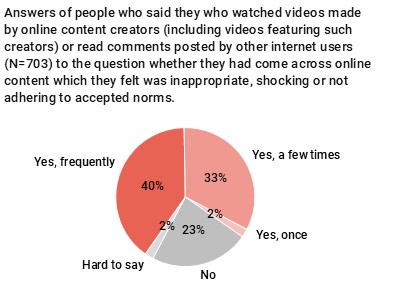24/2024
2024-11-12
Inappropriate Online Content
Today’s idea of the internet, which is based to a large extent on social media, assumes that not only can everyone receive information, but that all of us can create and post it. Although such democratisation of the creation and passing on of material has many advantages, there are also risks arising from the fact that online content is not subject to the same controls as the traditional media of TV, radio and press. CBOS asked Polish people whether they had come across online content which they felt was inappropriate, shocking or not adhering to accepted norms. This turned out to be the experience of three quarters of the people who watch videos made by online content creators (including videos featuring such creators) or read comments posted by other internet users. Worth underlining is the fact that for a majority of respondents (73%) this was not an isolated experience and for two fifths (40%) it was something they experienced frequently.

|
More on this subject in the CBOS report.
This ‘Current Events and Problems’ survey (412) was conducted using a mixed-mode procedure on a representative sample of named adult residents of Poland, randomly selected from the National Identity Number (PESEL) register. Respondents independently selected one of the following methods: Computer Assisted Personal Interview (CAPI); Computer Assisted Telephone Interview (CATI), respondents receiving researchers’ telephone numbers in an introductory letter from CBOS; Computer Assisted Web Interview (CAWI), where respondents filled in the online questionnaire independently, gaining access by means of a login and password provided in an introductory letter from CBOS. In all three cases the questionnaire had the same structure and comprised the same questions. The survey was carried out between 14 – 25 August 2024 inclusive on a sample of 939 people (66.7% using the CAPI method, 20.3% CATI and 13% CAWI). CBOS has been conducting statutory research using the above procedure since May 2020, stating in each case the percentage of personal, telephone and internet interviews.





